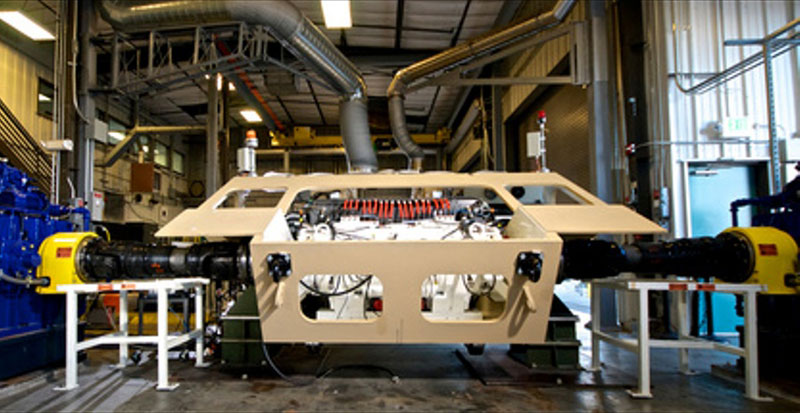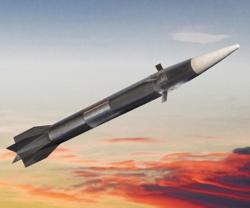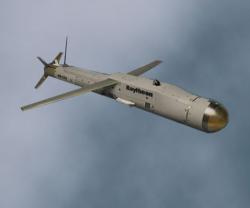BAE Completes 2,000 Miles of Hybrid GCV Testing
29.08.2013 Europe
BAE Systems’ Ground Combat Vehicle (GCV) Hybrid Electric Drive (HED) system successfully completed 2,000 miles of testing on a fully integrated “Hotbuck” mobility platform, a significant milestone for the U.S. Army’s GCV program.
The Hotbuck is a stationary, state-of-the-art test stand that simulates real-life environments and terrain and puts actual miles on the HED system. Under BAE Systems’ own rigorous timeline, the testing was completed four months ahead of schedule.
“This testing achievement is a significant advancement in the overall GCV program. With actual hardware to show, this puts the BAE Systems team ahead of schedule both now and in the next phase of the program, saving the customer development time and money,” said Mark Signorelli, Vice President and General Manager of Armored Combat Systems at BAE Systems.
“Our primary objective was to test our hybrid electric technology over time against realistic environments, and the successful completion of the testing is a testament to the quality and maturity of the technology,” he added.
Developing and testing actual hardware was not a program requirement for the Technology Development (TD) phase, but BAE Systems chose to take the initiative to demonstrate the fuel efficiency and performance of a hybrid system for the Army’s next infantry fighting vehicle.
The Hotbuck integrates HED components that will be used in BAE Systems’ GCV offering including the traction drive system, thermal systems, engines, generators, controllers and software. Conducted at the BAE Systems Santa Clara, California facility, the 2,000-mile advanced testing precisely replicated conditions at two well-known military test tracks. The results of the tests further validated the performance, efficiency and maturity of the HED technology applied in BAE Systems’ GCV design, marking a significant milestone for the TD phase of the program.
The HED system in BAE System’s GCV offering will contribute to: the availability of high torque at any ground speed resulting in greater agility, greater acceleration and maneuverability than a comparable mechanical system; up to 20 percent less fuel consumption than a conventionally powered GCV, reducing overall costs and the number of fuel convoys; availability of electrical power to incorporate new battlefield technology for the next 30 to 40 years; and 40 percent fewer parts than a comparable mechanical drive system, requiring less maintenance and decreasing vehicle lifetime cost.
BAE Systems was awarded a contract for the TD phase of the GCV program in August 2011. TD phase work is scheduled to be complete by June 2014.
The Hotbuck is a stationary, state-of-the-art test stand that simulates real-life environments and terrain and puts actual miles on the HED system. Under BAE Systems’ own rigorous timeline, the testing was completed four months ahead of schedule.
“This testing achievement is a significant advancement in the overall GCV program. With actual hardware to show, this puts the BAE Systems team ahead of schedule both now and in the next phase of the program, saving the customer development time and money,” said Mark Signorelli, Vice President and General Manager of Armored Combat Systems at BAE Systems.
“Our primary objective was to test our hybrid electric technology over time against realistic environments, and the successful completion of the testing is a testament to the quality and maturity of the technology,” he added.
Developing and testing actual hardware was not a program requirement for the Technology Development (TD) phase, but BAE Systems chose to take the initiative to demonstrate the fuel efficiency and performance of a hybrid system for the Army’s next infantry fighting vehicle.
The Hotbuck integrates HED components that will be used in BAE Systems’ GCV offering including the traction drive system, thermal systems, engines, generators, controllers and software. Conducted at the BAE Systems Santa Clara, California facility, the 2,000-mile advanced testing precisely replicated conditions at two well-known military test tracks. The results of the tests further validated the performance, efficiency and maturity of the HED technology applied in BAE Systems’ GCV design, marking a significant milestone for the TD phase of the program.
The HED system in BAE System’s GCV offering will contribute to: the availability of high torque at any ground speed resulting in greater agility, greater acceleration and maneuverability than a comparable mechanical system; up to 20 percent less fuel consumption than a conventionally powered GCV, reducing overall costs and the number of fuel convoys; availability of electrical power to incorporate new battlefield technology for the next 30 to 40 years; and 40 percent fewer parts than a comparable mechanical drive system, requiring less maintenance and decreasing vehicle lifetime cost.
BAE Systems was awarded a contract for the TD phase of the GCV program in August 2011. TD phase work is scheduled to be complete by June 2014.
Previous PostTDW Demonstrates Scalable Warhead Technology
Latest news
Latest events
IDEF 2025 Turkey - International Defence Industry Fair
22 - 27 Jul 2025Istanbul Expo Center - TurkeyDSEI 2025
09 - 12 Sep 2025Excel, London - United KingdomIntersec Saudi Arabia
29 Sep - 01 Oct 2025Riyadh International Exhibition & Convention Centre - Saudi ArabiaDubai International Air Chiefs’ Conference (DIACC 2025)
16 Nov 2025Atlantis, The Palm Dubai - United Arab Emirates






















